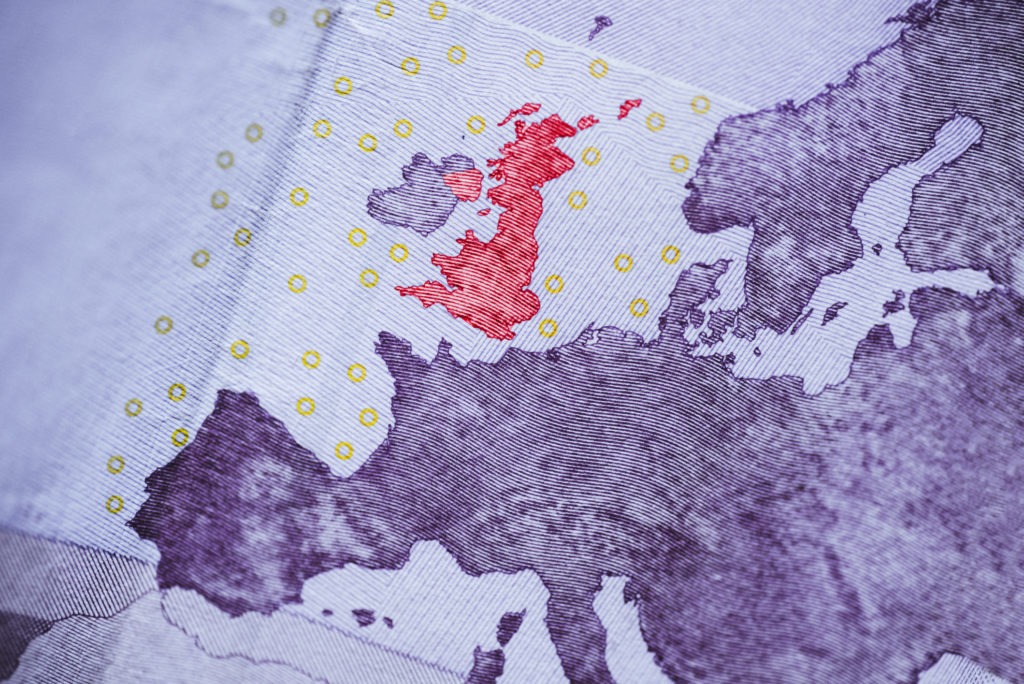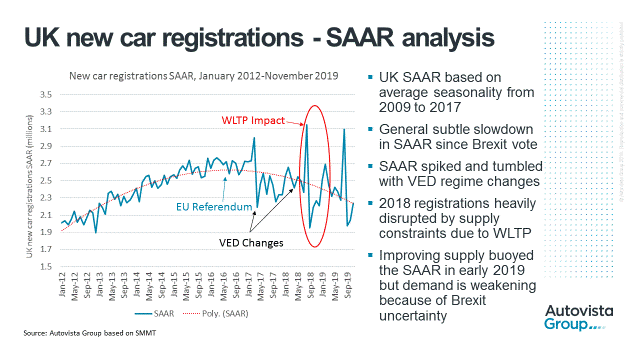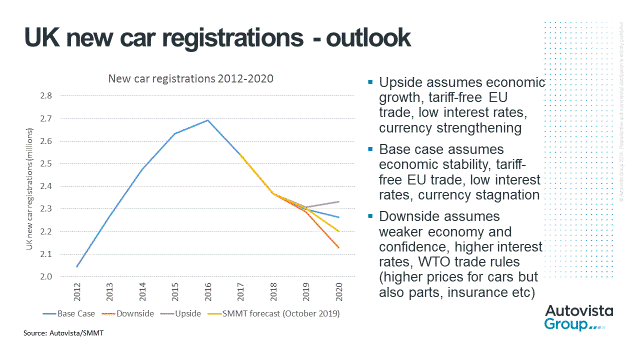UK new car market SAAR continues gentle growth in November
05 December 2019

5 December 2019
Autovista Group’s senior data journalist Neil King has calculated that the seasonally-adjusted annualised rate (SAAR) of the UK new car market improved again in November, to over 2.2 million registrations, based on the latest market data. However, it remains lower than in all months in 2019 except September and October.
“The November result was in line with Autovista Group’s forecast for the month and the expected decline in December means we still predict that 2019 will finish 2.9% down on 2018 in our baseline forecast,”³ said King.
Similarly, the forecast for 2020 has been unchanged and Autovista Group still expects a 1.5% decline in new-car registrations. If the UK leaves the EU without a deal, however, the impact is expected to be more severe and the downside forecast calls for a 7.0% drop in 2020. If Brexit is cancelled entirely, modest growth of 1.0% is anticipated, explained King.
 Source: Autovista Group based on SMMT data
New car registrations in the UK fell by 1.3% year-on-year in November, according to the latest data released today by the Society of Motor Manufacturers and Traders (SMMT). This is a comparatively modest downturn but follows a 3.0% year-on-year decline in demand in November 2018 as the new WLTP emissions regulations continued to disrupt supply.
Mike Hawes, SMMT Chief Executive, said, ′These are challenging times for the UK new-car market, with another fall in November reflecting the current climate of uncertainty.’
This maintains the downward trend for new-car registrations throughout 2019, as multiple factors, including weak business and consumer confidence, economic uncertainty and confusion over diesel and clean-air zones, combined to affect demand, according to the SMMT statement.
Source: Autovista Group based on SMMT data
New car registrations in the UK fell by 1.3% year-on-year in November, according to the latest data released today by the Society of Motor Manufacturers and Traders (SMMT). This is a comparatively modest downturn but follows a 3.0% year-on-year decline in demand in November 2018 as the new WLTP emissions regulations continued to disrupt supply.
Mike Hawes, SMMT Chief Executive, said, ′These are challenging times for the UK new-car market, with another fall in November reflecting the current climate of uncertainty.’
This maintains the downward trend for new-car registrations throughout 2019, as multiple factors, including weak business and consumer confidence, economic uncertainty and confusion over diesel and clean-air zones, combined to affect demand, according to the SMMT statement.
 Source: Autovista Group/SMMT
Record 10% share for alternatively-fuelled vehicles
In November, the decline was driven primarily by weak private demand, with registrations down 6.1%. Registrations to the business channel also fell, by 3.2%, but fleet registrations fared better, up 2.8%. For the second consecutive month, registrations of alternatively-fuelled vehicles (AFVs) gained a record market share. More than one in 10 cars joining UK roads in November were either hybrid, plug-in hybrid or pure electric.
Demand for battery-electric vehicles (BEVs) surged by 228.8%, with 4,652 cars registered. Demand for plug-in hybrids and hybrids also rose – by 34.8% and 15.0% respectively. Registrations of new petrol cars grew 2.0% but diesel fell 27.2% as consumers continue to defect from the beleaguered fuel type.
′It’s good news ″¦, to see registrations of electrified cars surging again, and 2020 will see manufacturers introduce plenty of new, exciting models to give buyers even more choice. Nevertheless, there is still a long way to go for these vehicles to become mainstream and, to grow uptake further, we need fiscal incentives, investment in charging infrastructure and a more confident consumer,’ said Hawes.
In the year-to-date, the new car market is down 2.7% compared to the first 11 months of 2018. PHEV registrations were 21.5% lower than in the first 11 months of 2018 but HEVs and BEVs were up by 16.4% and 135.6% respectively, compared to the same period last year.
Outlook unchanged as general election looms
Despite the 5.5% decline in new car registrations in December 2018, compared to December 2017, due to ongoing disruption to supply as a result of the implementation of WLTP, another market contraction is expected in December 2019. Aside from the underlying weakness of demand, the general election, called for 12 December, will invariably disrupt the market to a certain extent too.
Source: Autovista Group/SMMT
Record 10% share for alternatively-fuelled vehicles
In November, the decline was driven primarily by weak private demand, with registrations down 6.1%. Registrations to the business channel also fell, by 3.2%, but fleet registrations fared better, up 2.8%. For the second consecutive month, registrations of alternatively-fuelled vehicles (AFVs) gained a record market share. More than one in 10 cars joining UK roads in November were either hybrid, plug-in hybrid or pure electric.
Demand for battery-electric vehicles (BEVs) surged by 228.8%, with 4,652 cars registered. Demand for plug-in hybrids and hybrids also rose – by 34.8% and 15.0% respectively. Registrations of new petrol cars grew 2.0% but diesel fell 27.2% as consumers continue to defect from the beleaguered fuel type.
′It’s good news ″¦, to see registrations of electrified cars surging again, and 2020 will see manufacturers introduce plenty of new, exciting models to give buyers even more choice. Nevertheless, there is still a long way to go for these vehicles to become mainstream and, to grow uptake further, we need fiscal incentives, investment in charging infrastructure and a more confident consumer,’ said Hawes.
In the year-to-date, the new car market is down 2.7% compared to the first 11 months of 2018. PHEV registrations were 21.5% lower than in the first 11 months of 2018 but HEVs and BEVs were up by 16.4% and 135.6% respectively, compared to the same period last year.
Outlook unchanged as general election looms
Despite the 5.5% decline in new car registrations in December 2018, compared to December 2017, due to ongoing disruption to supply as a result of the implementation of WLTP, another market contraction is expected in December 2019. Aside from the underlying weakness of demand, the general election, called for 12 December, will invariably disrupt the market to a certain extent too.
 Source: Autovista Group based on SMMT data
New car registrations in the UK fell by 1.3% year-on-year in November, according to the latest data released today by the Society of Motor Manufacturers and Traders (SMMT). This is a comparatively modest downturn but follows a 3.0% year-on-year decline in demand in November 2018 as the new WLTP emissions regulations continued to disrupt supply.
Mike Hawes, SMMT Chief Executive, said, ′These are challenging times for the UK new-car market, with another fall in November reflecting the current climate of uncertainty.’
This maintains the downward trend for new-car registrations throughout 2019, as multiple factors, including weak business and consumer confidence, economic uncertainty and confusion over diesel and clean-air zones, combined to affect demand, according to the SMMT statement.
Source: Autovista Group based on SMMT data
New car registrations in the UK fell by 1.3% year-on-year in November, according to the latest data released today by the Society of Motor Manufacturers and Traders (SMMT). This is a comparatively modest downturn but follows a 3.0% year-on-year decline in demand in November 2018 as the new WLTP emissions regulations continued to disrupt supply.
Mike Hawes, SMMT Chief Executive, said, ′These are challenging times for the UK new-car market, with another fall in November reflecting the current climate of uncertainty.’
This maintains the downward trend for new-car registrations throughout 2019, as multiple factors, including weak business and consumer confidence, economic uncertainty and confusion over diesel and clean-air zones, combined to affect demand, according to the SMMT statement.
 Source: Autovista Group/SMMT
Record 10% share for alternatively-fuelled vehicles
In November, the decline was driven primarily by weak private demand, with registrations down 6.1%. Registrations to the business channel also fell, by 3.2%, but fleet registrations fared better, up 2.8%. For the second consecutive month, registrations of alternatively-fuelled vehicles (AFVs) gained a record market share. More than one in 10 cars joining UK roads in November were either hybrid, plug-in hybrid or pure electric.
Demand for battery-electric vehicles (BEVs) surged by 228.8%, with 4,652 cars registered. Demand for plug-in hybrids and hybrids also rose – by 34.8% and 15.0% respectively. Registrations of new petrol cars grew 2.0% but diesel fell 27.2% as consumers continue to defect from the beleaguered fuel type.
′It’s good news ″¦, to see registrations of electrified cars surging again, and 2020 will see manufacturers introduce plenty of new, exciting models to give buyers even more choice. Nevertheless, there is still a long way to go for these vehicles to become mainstream and, to grow uptake further, we need fiscal incentives, investment in charging infrastructure and a more confident consumer,’ said Hawes.
In the year-to-date, the new car market is down 2.7% compared to the first 11 months of 2018. PHEV registrations were 21.5% lower than in the first 11 months of 2018 but HEVs and BEVs were up by 16.4% and 135.6% respectively, compared to the same period last year.
Outlook unchanged as general election looms
Despite the 5.5% decline in new car registrations in December 2018, compared to December 2017, due to ongoing disruption to supply as a result of the implementation of WLTP, another market contraction is expected in December 2019. Aside from the underlying weakness of demand, the general election, called for 12 December, will invariably disrupt the market to a certain extent too.
Source: Autovista Group/SMMT
Record 10% share for alternatively-fuelled vehicles
In November, the decline was driven primarily by weak private demand, with registrations down 6.1%. Registrations to the business channel also fell, by 3.2%, but fleet registrations fared better, up 2.8%. For the second consecutive month, registrations of alternatively-fuelled vehicles (AFVs) gained a record market share. More than one in 10 cars joining UK roads in November were either hybrid, plug-in hybrid or pure electric.
Demand for battery-electric vehicles (BEVs) surged by 228.8%, with 4,652 cars registered. Demand for plug-in hybrids and hybrids also rose – by 34.8% and 15.0% respectively. Registrations of new petrol cars grew 2.0% but diesel fell 27.2% as consumers continue to defect from the beleaguered fuel type.
′It’s good news ″¦, to see registrations of electrified cars surging again, and 2020 will see manufacturers introduce plenty of new, exciting models to give buyers even more choice. Nevertheless, there is still a long way to go for these vehicles to become mainstream and, to grow uptake further, we need fiscal incentives, investment in charging infrastructure and a more confident consumer,’ said Hawes.
In the year-to-date, the new car market is down 2.7% compared to the first 11 months of 2018. PHEV registrations were 21.5% lower than in the first 11 months of 2018 but HEVs and BEVs were up by 16.4% and 135.6% respectively, compared to the same period last year.
Outlook unchanged as general election looms
Despite the 5.5% decline in new car registrations in December 2018, compared to December 2017, due to ongoing disruption to supply as a result of the implementation of WLTP, another market contraction is expected in December 2019. Aside from the underlying weakness of demand, the general election, called for 12 December, will invariably disrupt the market to a certain extent too.